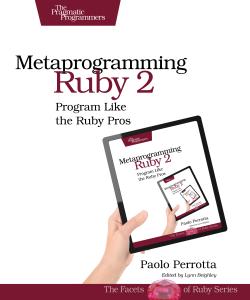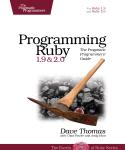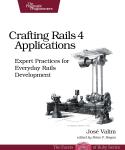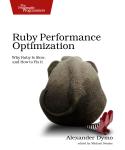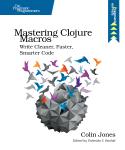About This Title
Pages: 276
Published: August 2014
ISBN: 9781941222126
In Print

Metaprogramming Ruby 2
Program Like the Ruby Pros
by Paolo Perrotta
Write powerful Ruby code that is easy to maintain and change. With metaprogramming, you can produce elegant, clean, and beautiful programs. Once the domain of expert Rubyists, metaprogramming is now accessible to programmers of all levels. This thoroughly revised and updated second edition of the bestselling Metaprogramming Ruby explains metaprogramming in a down-to-earth style and arms you with a practical toolbox that will help you write your best Ruby code ever.
eBook Formats:
PDF for desktop/tablets
epub for Apple Books, e-readers
mobi for Kindle readers
Get all eBook formats here for $27.95 (USD)
Dig under the surface and explore Ruby’s most advanced feature: a collection of techniques and tricks known as metaprogramming. In this book, you’ll learn metaprogramming as an essential component of Ruby and discover the deep, non-obvious details of the language. Once you understand the tenets of Ruby, including the object model, scopes, and singleton classes, you’re on your way to applying metaprogramming both in your daily work assignments and in your fun, after-hours projects.
Metaprogramming Ruby, Second Edition makes mastering the language enjoyable. The book is packed with:
- Pragmatic examples of metaprogramming in action, many of which come straight from real-life gems such as Rails.
- Programming challenges that let you experiment and play with some of the most out-there metaprogramming concepts.
- Metaprogramming “spells”—33 practical recipes and idioms that you can study and apply right now, to write code that is sure to impress.
This completely revised new edition covers the new features in Ruby 2.0 and 2.1, and contains code from the latest Ruby libraries, including Rails 4. Most examples are new, “from the wild,” with more recent libraries. And the book reflects current ideas of when and how much metaprogramming you should use.
Whether you’re a Ruby apprentice on the path to mastering the language or a Ruby wiz in search of new tips, this book is for you.
What You Need
Ruby 2.x, Ruby 1.9, or a recent version of JRuby.Resources
Releases:
Contents & Extracts
- Metaprogramming Ruby
- The M Word
- Ghost Towns and Marketplaces
- The Story of Bob, Metaprogrammer
- Metaprogramming and Ruby
- Monday: The Object Model
- Open Classes
- Inside the Object Model
- Quiz: Missing Lines
- What Happens When You Call a Method?
- Quiz: Tangle of Modules
- Wrap-Up
- Tuesday: Methods
excerpt

- A Duplication Problem
- Dynamic Methods
- method_missing
- Quiz: Bug Hunt
- Blank Slates
- Wrap-Up
- Wednesday: Blocks
- The Day of the Blocks
- Quiz: Ruby#
- Blocks Are Closures
excerpt

- instance_eval()
- Callable Objects
- Writing a Domain-Specific Language
- Quiz: A Better DSL
- Wrap-Up
- Thursday: Class Definitions
- Class Definitions Demystified
- Quiz: Class Taboo
- Singleton Methods
- Singleton Classes
- Quiz: Module Trouble
- Method Wrappers
- Quiz: Broken Math
- Wrap-Up
- Friday: Code That Writes Code
- Coding Your Way to the Weekend
- Kernel#eval
- Quiz: Checked Attributes (Step 1)
- Quiz: Checked Attributes (Step 2)
- Quiz: Checked Attributes (Step 3)
- Quiz: Checked Attributes (Step 4)
- Hook Methods
- Quiz: Checked Attributes (Step 5)
- Wrap-Up
- Epilogue
- The M Word
- Metaprogramming in Rails
- Preparing for a Rails Tour
- Ruby on Rails
- Installing Rails
- The Rails Source Code
- The Design of ActiveRecord
- A Short ActiveRecord Example
- How ActiveRecord Is Put Together
- A Lesson Learned
- ActiveSupport’s Concern Module
excerpt

- Rails Before Concern
- ActiveSupport::Concern
- A Lesson Learned
- The Rise and Fall of alias_method_chain
- The Rise of alias_method_chain
- The Fall of alias_method_chain
- A Lesson Learned
- The Evolution of Attribute Methods
- Attribute Methods in Action
- A History of Complexity
- A Lesson Learned
- One Final Lesson
- Metaprogramming Is Just Programming
- Preparing for a Rails Tour
- Appendixes
- Common Idioms
- Mimic Methods
- Nil Guards
- Self Yield
- Symbol#to_proc()
- Domain-Specific Languages
- The Case for Domain-Specific Languages
- Internal and External DSLs
- DSLs and Metaprogramming
- Spell Book
- The Spells
- Common Idioms
Author
Paolo Perrotta has fifteen years of experience as a developer, ranging from embedded to enterprise software, computer games, and web applications. Paolo lives a nomadic life, mentoring agile teams throughout Europe. He has a base camp in Bologna, Italy. He loves Ruby.eBook Formats:
PDF for desktop/tablets
epub for Apple Books, e-readers
mobi for Kindle readers
Get all eBook formats here for $27.95 (USD)
Related Titles:

About This Title
Pages: 276
Published: August 2014
ISBN: 9781941222126
Edition: 1
In Print
